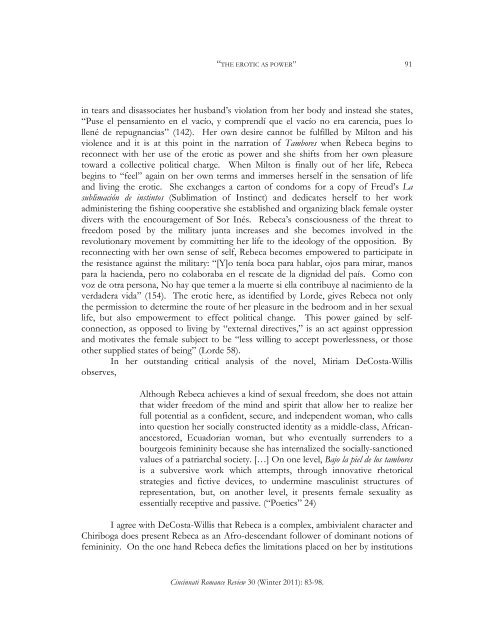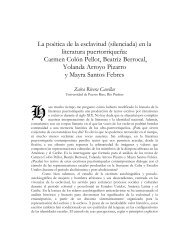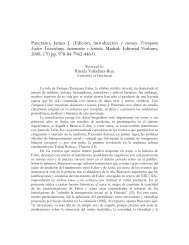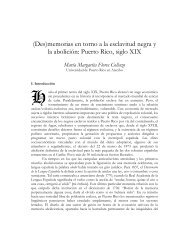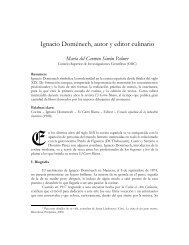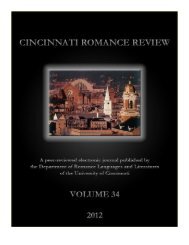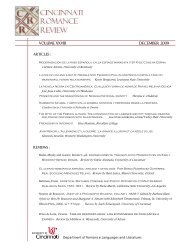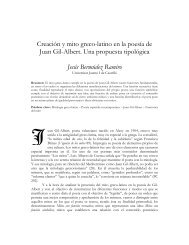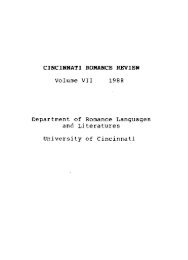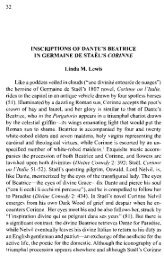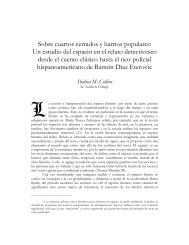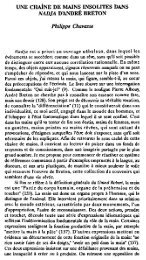Volume 30 (2011) - Cincinnati Romance Review
Volume 30 (2011) - Cincinnati Romance Review
Volume 30 (2011) - Cincinnati Romance Review
Create successful ePaper yourself
Turn your PDF publications into a flip-book with our unique Google optimized e-Paper software.
“THE EROTIC AS POWER” 91<br />
in tears and disassociates her husband’s violation from her body and instead she states,<br />
“Puse el pensamiento en el vacío, y comprendí que el vacío no era carencia, pues lo<br />
llené de repugnancias” (142). Her own desire cannot be fulfilled by Milton and his<br />
violence and it is at this point in the narration of Tambores when Rebeca begins to<br />
reconnect with her use of the erotic as power and she shifts from her own pleasure<br />
toward a collective political charge. When Milton is finally out of her life, Rebeca<br />
begins to “feel” again on her own terms and immerses herself in the sensation of life<br />
and living the erotic. She exchanges a carton of condoms for a copy of Freud’s La<br />
sublimación de instintos (Sublimation of Instinct) and dedicates herself to her work<br />
administering the fishing cooperative she established and organizing black female oyster<br />
divers with the encouragement of Sor Inés. Rebeca’s consciousness of the threat to<br />
freedom posed by the military junta increases and she becomes involved in the<br />
revolutionary movement by committing her life to the ideology of the opposition. By<br />
reconnecting with her own sense of self, Rebeca becomes empowered to participate in<br />
the resistance against the military: “[Y]o tenía boca para hablar, ojos para mirar, manos<br />
para la hacienda, pero no colaboraba en el rescate de la dignidad del país. Como con<br />
voz de otra persona, No hay que temer a la muerte si ella contribuye al nacimiento de la<br />
verdadera vida” (154). The erotic here, as identified by Lorde, gives Rebeca not only<br />
the permission to determine the route of her pleasure in the bedroom and in her sexual<br />
life, but also empowerment to effect political change. This power gained by selfconnection,<br />
as opposed to living by “external directives,” is an act against oppression<br />
and motivates the female subject to be “less willing to accept powerlessness, or those<br />
other supplied states of being” (Lorde 58).<br />
In her outstanding critical analysis of the novel, Miriam DeCosta-Willis<br />
observes,<br />
Although Rebeca achieves a kind of sexual freedom, she does not attain<br />
that wider freedom of the mind and spirit that allow her to realize her<br />
full potential as a confident, secure, and independent woman, who calls<br />
into question her socially constructed identity as a middle-class, Africanancestored,<br />
Ecuadorian woman, but who eventually surrenders to a<br />
bourgeois femininity because she has internalized the socially-sanctioned<br />
values of a patriarchal society. […] On one level, Bajo la piel de los tambores<br />
is a subversive work which attempts, through innovative rhetorical<br />
strategies and fictive devices, to undermine masculinist structures of<br />
representation, but, on another level, it presents female sexuality as<br />
essentially receptive and passive. (“Poetics” 24)<br />
I agree with DeCosta-Willis that Rebeca is a complex, ambivialent character and<br />
Chiriboga does present Rebeca as an Afro-descendant follower of dominant notions of<br />
femininity. On the one hand Rebeca defies the limitations placed on her by institutions<br />
<strong>Cincinnati</strong> <strong>Romance</strong> <strong>Review</strong> <strong>30</strong> (Winter <strong>2011</strong>): 83-98.


